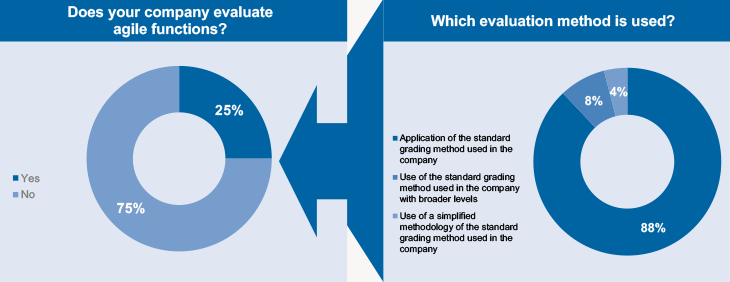- New Work concept and agile working present the greatest challenges
- Trend towards reducing complexity and workload, and moving away from rigid analytical evaluation systems continues
hkp/// group study Grading during Transformation 2021
Frankfurt am Main, 11/30/2021. Grading during Transformation 2021, a cross-industry study by consultancy firm hkp/// group, shows a clear shift in the design, use and spread of job grading. This approach is increasingly being seen as a tool for flexible organizational planning, particularly in the context of strategic compensation benchmarking. Mapping New Work and agile organizational structures, as well as the new job profiles found in these organizations, presents considerable challenges. The trend towards reducing complexity and workload, and moving away from stringent analytical assessment systems continues.
The online survey was conducted during the third quarter of 2021. 92 companies from key industries and with significant operations in Germany took part. 56 % of participants are publicly listed companies. Results of the current study were compared to a similar hkp/// group analysis from 2016.
“HR experts face transformation-related challenges every day, from the introduction of agile work structures and scaling back of management levels to the reorganization of business units. Our study shows that grading is conceptually and technically suitable as a basis for evaluating and managing organizational change. It is more prevalent than ever before and is increasingly attracting the interest of executives outside of HR, especially in conjunction with structural cost analyses,” explains Verena Vandervelt, senior manager and lead study author in the hkp/// group Grading Team.
Grading today: The most significant results and findings at a glance
- In addition to large corporations, medium-sized and smaller companies are also increasingly recognizing the potential that grading offers. Their primary objective is to classify the value of existing and new functions or job descriptions in the company and to create transparency.
- Less complex ("summalytic") evaluation processes are increasingly being favored over purely analytical ones, as they allow a much more flexible approach to frequent organizational changes while maintaining the validity of evaluations.
- Evaluation systems need to be as simple and efficient as possible, and companies are becoming increasingly willing to revise their grading systems in order to achieve this.
- Agile structures and New Work requirements present the greatest challenges when it comes to adapting grading systems. Companies that have opted for both agile and traditional ways of working are especially keen to ensure the compatibility of the systems they use.
- The early involvement of the Executive Board or top level management when introducing grading systems is a factor for success; more so than ever before. Ongoing governance generally remains the responsibility of HR or Compensation &Benefits departments.
- Specific IT tools for job grading are usually implemented to reduce workload and support easy administration and governance. The integration of grading results into HR suite solutions is becoming increasingly important.
- Large and medium-sized businesses are increasingly using grading as a basis for fair pay analyses and for insights into organizational costs. Here, grading systems help to answer questions on compensation drivers, the number and proportion of employees per value level, and their distribution across functional areas, organizational units, countries, etc. In addition, they are used to identify spans of control and the connection between organizational positioning and company performance.
Fig.: Agile roles and grading
Grading as a management tool with strategic potential
Looking at the surprisingly positive development of job grading in Germany, hkp// group partner Isabel Jahn concludes, “Grading isn’t an old-school HR approach; it’s proving to be an effective tool in HR and organizational planning and especially in connection with compensation, structure and strategy. The days of underestimating the potential that grading offers and of those outside of HR dismissing the tool as just another organizational toy seem to be over.”
A detailed summary of the key findings of the hkp//group study Grading during Transformation 2021 is available via info@hkp.com.
About the hkp/// group
The hkp/// group is a partner-led, international consulting firm. Being accomplished transformation consultants, hkp/// group partners are respected leaders of innovation in HR and advise large and medium-sized international companies and start-ups that they develop customized and practical solutions with. The hkp/// group’s partners have many years of international consulting and business experience. They are recognized on the market as being experts in executive compensation, board services, performance and talent management, HR strategy and transformation, and HR and compensation benchmarking. Our partners are appreciated as competent contacts by supervisory and executive boards, management boards and company management teams, as well as HR managers and specialists. With over 700,000 data records on compensation from over 60 countries and all industries, the hkp/// group is one of the leading providers of compensation comparisons. In the field of executive compensation alone, we offer access to compensation data for 20,000 people in over 3,000 European companies (boardpay.com).
Contact Thomas Müller, cell: +49 (0)176 100 88 237, email: thomas.mueller@hkp.com







